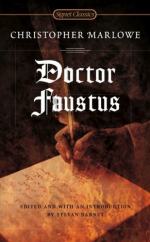|
This section contains 5,570 words (approx. 19 pages at 300 words per page) |

|
SOURCE: "The Unity of Marlowe's Doctor Faustus," in his A Shaping Joy: Studies in the Writer's Craft, Methuen & Co., 1971, pp. 367-80.
In the following essay first given as a lecture in 1965, Brooks argues that the middle of Doctor Faustus supports, rather than disrupts, the unity of the drama, and he defends the poetry in Faustus's final soliloquy as an expression of the individuality that "is at once his glory and his damnation."
In his Poetics, Aristotle observed that a tragedy should have a beginning, a middle, and an end. The statement makes a point that seems obvious, and many a reader of our time must have dismissed it as one of more tedious remarks of the Stagirite, or indeed put it down to one of the duller notes taken by the student whom some suppose to have heard Aristotle's lectures and preserved the substance of them for us...
|
This section contains 5,570 words (approx. 19 pages at 300 words per page) |

|


